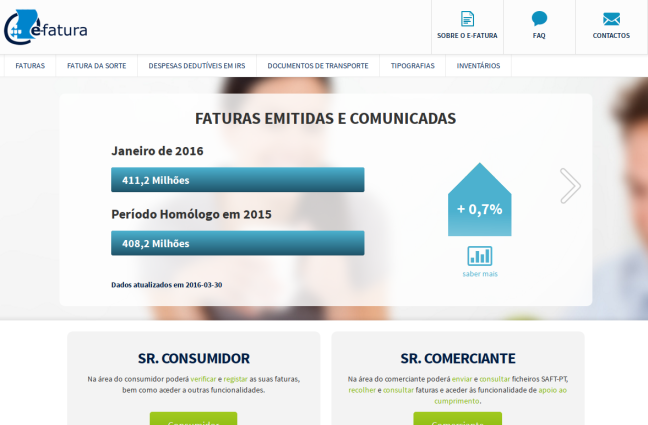Portugal’s government took a pioneering step in 2013 with a new system for registering and checking invoices. This involves not only companies but also citizens, who now have more responsibility in fighting the “parallel economy” and are getting the message that everyone will gain if everyone pays their taxes.
The eFatura system was highly praised within the OECD, which has made several recommendations to limit parallel economies, yet without the thorough state backing that the Portuguese system has now made possible.
Implementation of the new system meant a huge transformation, not only in the back office of Autoridade Tributária, the country’s tax administration, but also in the invoicing systems of every company that sends out more than 1,000 invoices every year or handles transactions worth more than 100,000 euros. eFatura takes advantage of citizens’ willingness to check that every company declares all its business dealings to the financial authorities.
The results have already proved the value of the system. Every year, eFatura registers more than 5.2 billion invoices, while more than 8 million Portuguese citizens have signed up to handle their tax affairs online.
Parallel economy and tax evasion
Portugal’s finance ministry defines eFatura as a “citizenship project” designed to limit the impact of the parallel economy and tax evasion, while transferring the resulting benefits back to citizens. These benefits include a better picture of where their household spending goes, more generous tax deductions in some categories, and a lottery with cars as prizes – the lottery tickets are the VAT numbers of registered invoices.
eFatura has already received several awards. Recently, however, it has also created arguments over its unusual process for double verification of invoices with poor references. This caused problems in the run-up to the annual deadline for submitting income tax returns.

Policy Context
Combating tax evasion has been one of the main drivers for Portugal’s tax administration for the last couple of years. In some countries, the UN’s OECD agency estimates that the so-called “parallel economy” might account for 20 or 25% of the economy’s real value – and so deprive the government of almost a quarter of its rightful tax revenues. And even though Portugal is not one of the world’s most “informal” economies, the government believed it was essential to take measures to guarantee that a greater proportion of economic transactions were registered.
The tax authorities originally concentrated their efforts in three economic areas: cafés and restaurants, hairdressers and beauty salons, and car repair shops. Since then, the areas covered have grown to include education, health, general family expenses and housing.
To support the transformation, the Portuguese government had to change the law. Examples include requirements to use certified invoicing software, and new rules on transport documentation for some types of businesses. At the same time, new fiscal incentives have included lower tax deductions and a lottery that gives cars to random taxpayers.
Description of target users and groups
The target users of eFatura are both citizens and companies. The latter are now obliged to print invoices for every transaction and declare them directly via a web portal. Companies can use either a manual registration system or a web service connected to their financial software, which has to be certified by tax authorities.
Description of the way to implement the initiative
The use of web services in tax obligations is widespread in Portugal. When the first electronic declaration system started in 1997, its acceptance by citizens exceeded expectations. In 2002 all the existing systems were consolidated into a single portal where citizens could find all the information they needed on taxes relating to their earnings, vehicles, and real estate. By December 2013 there were about 400 different services online, and the Internet is now the main way by which Portuguese citizens deal with the tax authorities.
The idea of providing tax information voluntarily is well accepted, since the advantages are well understood by citizens. The systems are easy to use and convenient, no longer requiring visits to the tax office during working hours.
Technology solution
Technology choice: Standards-based technologyMain results, benefits and impacts
The huge number of invoices declared, checked and validated through the eFatura portal is one of the best measures of the system’s success.
Seeking to minimise their tax bills, and also perhaps to win a car, taxpayers use the service to declare their incomes, working through either a web browser or the various mobile applications provided by the tax authorities. The marketing campaigns have also succeeded in increasing the number of invoices raised for everyday economic transactions. Previously, many people did not bother to ask for a VAT receipt when buying a coffee, for instance, or a basket of groceries at the supermarket. Now more transactions are invoiced, resulting in a society that is fairer, more transparent, and with higher tax revenues.
The online system has been built as a very robust platform to support a huge number of simultaneous accesses. The tax authorities now plan to invest in “big data” systems to improve their use of the information, evaluate risks, build predictive systems, and study the behaviour of users in more detail.

